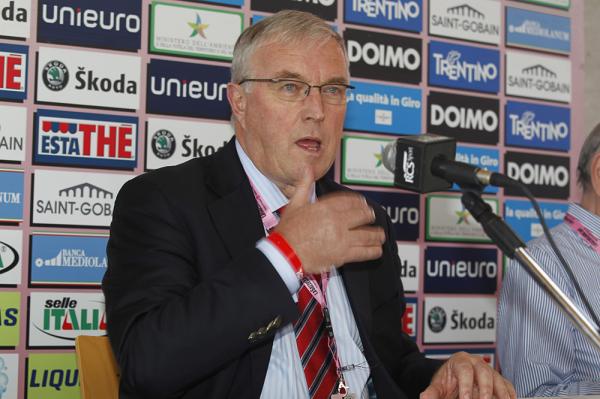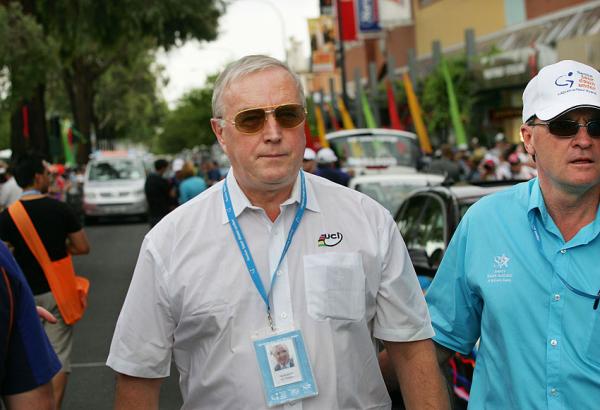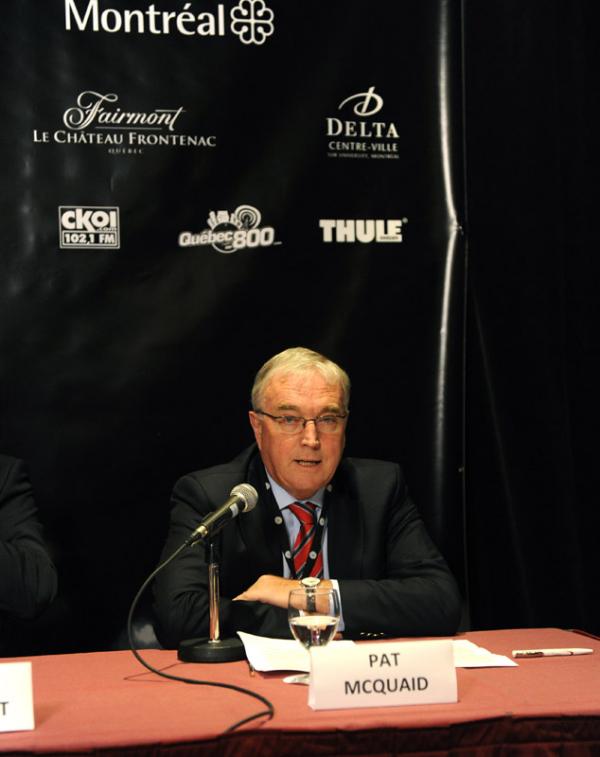McQuaid says there will be no Contador verdict until 2011
UCI President speaks of reduced sentences for "lighter" substances



Pat McQuaid has said that a verdict in the Alberto Contador case will not be reached before the end of the year. The UCI president also moved to defend his organisation’s secretive handling of the affair in the weeks before Contador publicly revealed that he had returned an adverse analytical finding for Clenbuterol during the Tour de France.
“The UCI has been criticised because it hasn’t communicated on this matter, but it’s not a classic case of doping,” McQuaid told L’Équipe. “At the end of August, along with WADA, we gave Contador the chance to explain himself. Twenty-four hours later, he told us this story of the contaminated meat. We asked some experts to conduct a study to see if his version is credible. There won’t be a decision before the end of the year.”
McQuaid also claimed that while his personal preference was for life bans for doping offences, such measures would be legally difficult to introduce. The UCI will instead seek the introduction of four-year suspensions for EPO positives.
“I’m in favour of increasing the length of the suspension,” he said. “There should be a four-year ban for those who take EPO. We’re going to propose that soon to the national federations and they will need to be on the same page as us because if we had to keep asking for CAS arbitration, it wouldn’t go ahead.”
However, McQuaid favours more lenient penalties for certain other substances and thus appeared to open the door to a potentially reduced sentence for Contador, should he ultimately be sanctioned in the Clenbuterol affair.
“Light and heavy products should be differentiated,” McQuaid explained. “EPO is serious, that should be a four-year ban. Ventoline, for example, that could be six or nine months.”
McQuaid also told L’Équipe that he is happy to welcome back suspended riders who make a visible effort to atone for their transgressions but admitted that not all returning riders have done so. McQuaid expressed his admiration for Ivan Basso’s comeback from suspension for his involvement in Operacion Puerto (“I was very, very happy for him’”) but was less impressed by Vacansoleil’s recruitment of Riccardo Riccò, who returned from a suspension for CERA use in March 2010.
Get The Leadout Newsletter
The latest race content, interviews, features, reviews and expert buying guides, direct to your inbox!
“I’ll just say that the management of that team have been naïve,” McQuaid said. “If were a director sportif, [Riccardo] Riccò would never come to my team.”
Vacansoleil also signed Ezequiel Mosquera, who returned an adverse analytical finding for Hydroxyethyl starch during the Vuelta a España. The UCI recently awarded the team a ProTeam licence for 2011.
In another doping-related matter, McQuaid commented on the most recent doping investigation in Spain. "In Spain, they say there aren't problems. It's not a big surprise for me to have seen Dr. Fuentes' name appear in recent days in a case concerning athletics."
Reducing the Giro and the Vuelta?
The UCI has been criticised in some quarters for the emphasis it places on spreading cycling beyond its traditional European boundaries but McQuaid explained that globalising the sport is a necessity and is dictated in part by the wishes of the International Olympic Committee (IOC).
“Cycling’s history was forged in Europe,” McQuaid said. “But it’s equally our duty to look at the world market. It’s not so much looking to make money as remembering that the Olympic Games are essential to our development in the world.
“The IOC carries out detailed studies on every sport. It introduces new disciplines into the Games and states that cycling is not universal. It puts pressure on us so that it will be, and it’s vital to stay part of the Olympic programme.”
McQuaid outlined that the financial aspect of cycling’s globalisation is also an important concern.
“In order to offer a global market to our sponsors, we need races everywhere,” he explained. “It’s true that the Tour of California clashes with the Giro, and I understand that the Grand Tours would like to have full visibility but that’s not always possible.”
McQuaid went on to admit that the Giro d’Italia and Vuelta a España could ultimately be reduced if cycling’s worldwide expansion continues
“I think we could reduce the length of the Giro and the Vuelta by a few days,” he said. “The Tour will always last three weeks. We can’t touch the Tour. It’s the biggest race in the world, it’s our shop window."

Barry Ryan was Head of Features at Cyclingnews. He has covered professional cycling since 2010, reporting from the Tour de France, Giro d’Italia and events from Argentina to Japan. His writing has appeared in The Independent, Procycling and Cycling Plus. He is the author of The Ascent: Sean Kelly, Stephen Roche and the Rise of Irish Cycling’s Golden Generation, published by Gill Books.